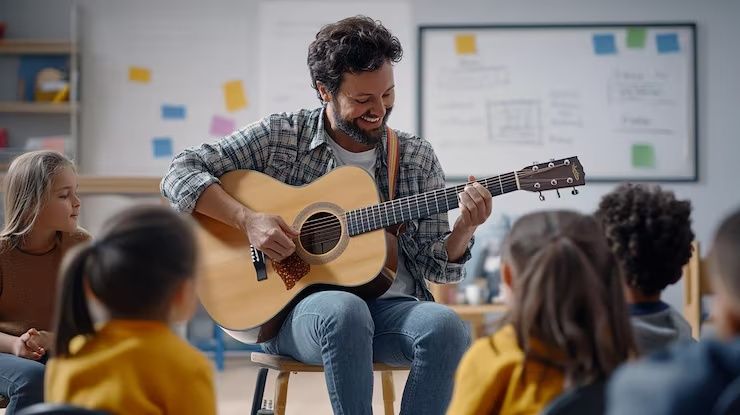Music education involves the study, practice, and understanding of music through structured learning. It encompasses areas such as music theory, instrument performance, vocal training, composition, and music appreciation. The field exists to cultivate musical skills, enhance creativity, and provide a structured framework for learning about different musical genres and traditions.
Importance
Music education plays a crucial role in personal, social, and cognitive development:

-
Cognitive benefits: Learning music enhances memory, spatial reasoning, and problem-solving skills.
-
Emotional development: Participation in music encourages self-expression, stress relief, and emotional intelligence.
-
Social skills: Group activities such as ensembles and choirs teach collaboration, communication, and teamwork.
-
Cultural awareness: Exposure to different music traditions promotes understanding of global cultures and history.
-
Academic performance: Studies suggest that students engaged in music education often perform better in other academic areas, including mathematics and language.
Music education impacts students, educators, and communities by fostering creativity, discipline, and appreciation for the arts.
Recent Updates
Several trends have shaped music education in the past year:
-
Digital learning platforms: In 2023–2024, online tutorials, virtual lessons, and interactive apps expanded access to music education.
-
Hybrid learning models: Schools and academies increasingly combine in-person and online instruction for flexible learning.
-
Inclusive music programs: Programs focusing on diverse musical traditions, adaptive instruments, and accessibility for students with disabilities have grown.
-
AI-assisted tools: Emerging software uses AI to provide personalized feedback on performance, composition, and practice techniques.
-
Community engagement: More initiatives promote local music projects, virtual performances, and collaborative music-making for public engagement.
These updates highlight how music education continues to adapt to technology, accessibility, and cultural inclusivity.
Laws or Policies
Music education is influenced by policies and regulations aimed at promoting arts education and ensuring quality standards:
-
National curriculum guidelines: Many countries include music as a core or elective subject in primary and secondary education.
-
Arts funding programs: Government programs provide grants, scholarships, or incentives to support music learning in schools and communities.
-
Accreditation standards: Music schools, conservatories, and universities often follow accreditation frameworks to ensure educational quality.
-
Inclusive education policies: Laws may mandate accessibility measures for students with disabilities, including adaptive instruments and support services.
-
Intellectual property laws: Regulations protect composers, educators, and institutions in the use and distribution of music materials.
These policies ensure that music education is accessible, standardized, and ethically managed.
Tools and Resources
A variety of tools and resources can support music learning and teaching:
-
Notation software: Programs such as Sibelius, Finale, and MuseScore allow composition, arrangement, and sheet music creation.
-
Practice apps: Tools like Yousician, Simply Piano, and SmartMusic provide interactive lessons and feedback.
-
Digital instruments: MIDI keyboards, digital pianos, and virtual instruments expand practice opportunities.
-
Online platforms: YouTube, Coursera, and specialized music education sites offer tutorials and courses.
-
Community networks: Forums, music associations, and social media groups facilitate collaboration, sharing, and peer support.
Example Table: Common Areas of Music Education
| Area of Study | Focus | Benefits |
|---|---|---|
| Music Theory | Scales, chords, harmony | Enhances understanding of music structure |
| Instrument Performance | Piano, guitar, violin, etc. | Improves dexterity and musical expression |
| Vocal Training | Singing techniques and exercises | Develops voice control and range |
| Composition | Writing original music | Fosters creativity and innovation |
| Music Appreciation | History, genres, and cultural studies | Increases cultural awareness and listening skills |
This table helps learners identify areas of focus based on interest and goals.
FAQs
What age is suitable to start music education?
Music learning can begin at a young age, often as early as 3–5 years old for basic rhythm and instrument exploration, but adults can also start at any stage.
Does learning music improve academic skills?
Yes, research shows correlations between music education and improved math, reading, memory, and spatial reasoning abilities.
Can music education be self-taught?
While formal guidance accelerates learning, online resources, apps, and tutorials enable self-directed study effectively.
How can music education accommodate students with disabilities?
Adaptive instruments, specialized teaching methods, and accessible materials help students with disabilities engage in music learning.
What career paths are available in music education?
Graduates can pursue careers as music teachers, conductors, composers, performers, music therapists, and academic researchers.
Conclusion
Music education is a vital part of personal development, cognitive growth, and cultural enrichment. It combines theory, performance, and appreciation to foster creativity, emotional expression, and social skills.
Recent trends in digital learning, inclusive programs, and AI-assisted tools demonstrate that music education continues to evolve with technology and societal needs. Policies and regulations ensure that these programs maintain quality, accessibility, and ethical standards.
By understanding its fundamentals, benefits, tools, and trends, students, educators, and communities can harness music education to inspire creativity, enhance learning, and promote cultural awareness across generations.